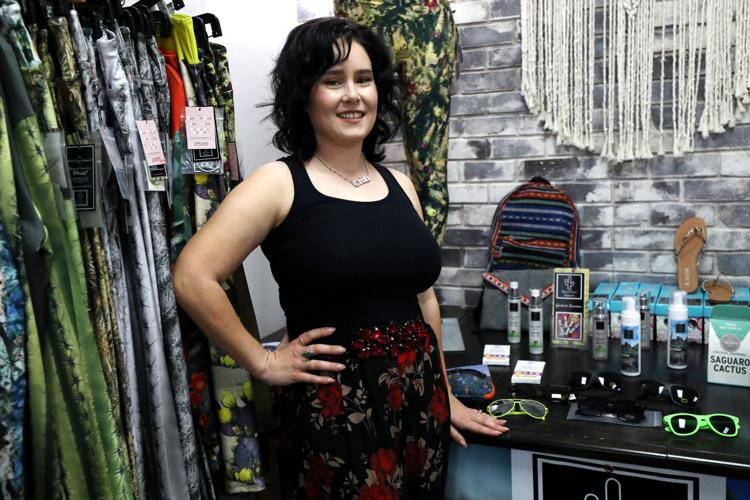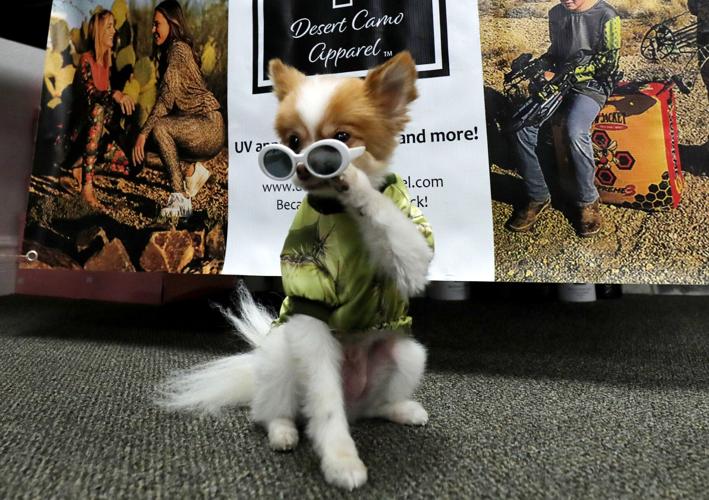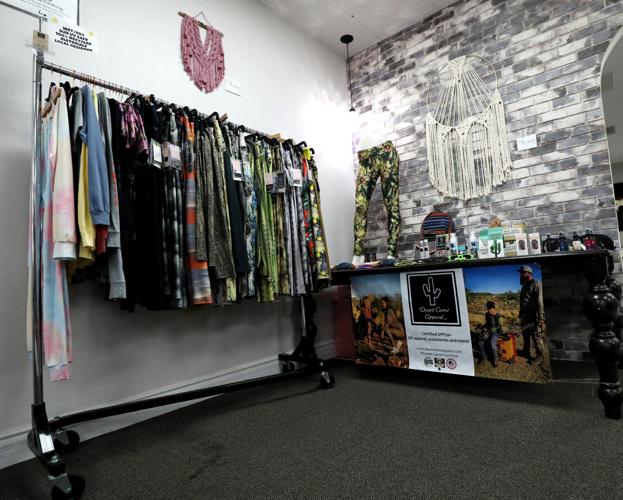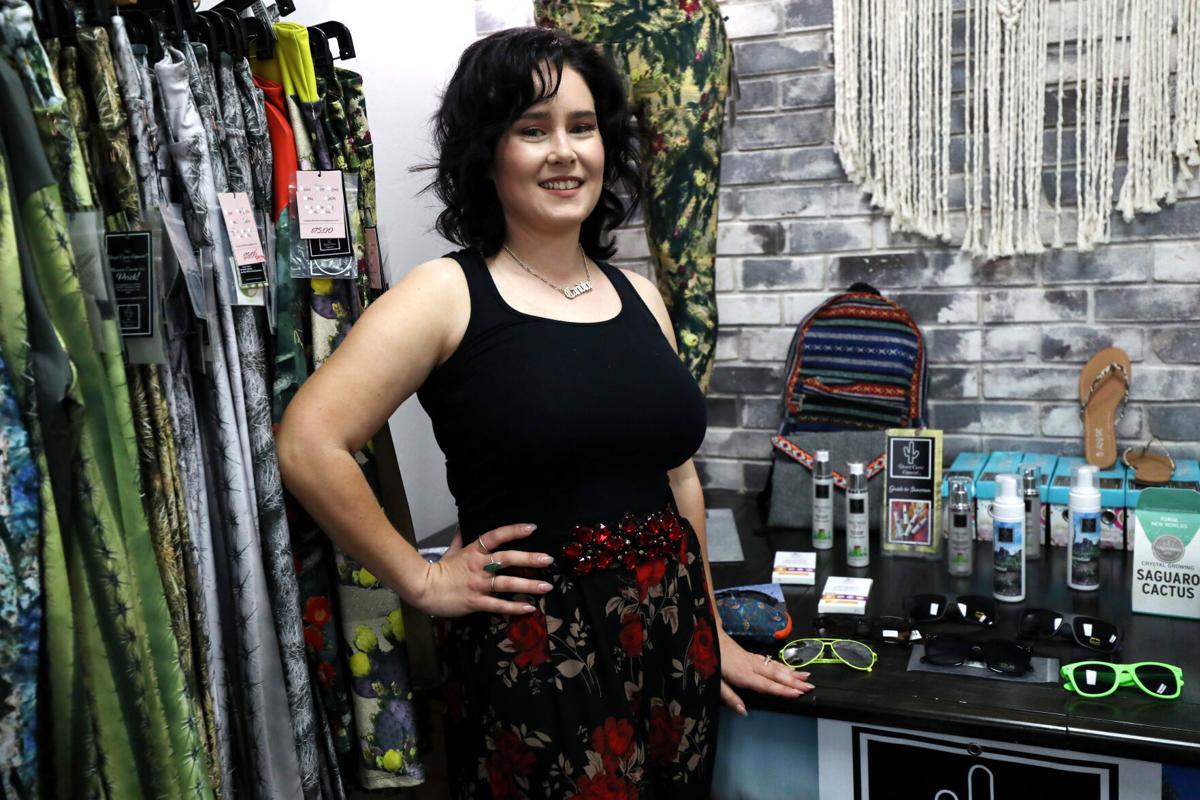Five years ago, Candice Mason learned she had skin cancer after a routine mole removal.
"When I was first diagnosed, I thought, 'I have a bucket list, so I'm going to move it up,'" Mason recalls. She had always thought about starting a business.
"As I was sitting in the (chemotherapy) infusion chair, I thought, 'How can I turn my negative into a positive and educate others in my community about the dangers of UV radiation?'"
She came up with the idea of UPF protective clothing and accessories.

Now 39, Mason is the founder and owner of Desert Camo Apparel LLC, a Tucson-based company that produces desert-themed clothing and accessories certified with a UV Protection Factor of 50+.
"What makes me different than anyone else is the desert element in the pattern and the prints," she said. "I feel like I'm developing new kinds of camouflage."
With patterns that include prickly pears, saguaro ribs, javelina hide and a gem show design that resembles the inside of a geode, Mason's camouflage is not your typical mossy oak pattern. Her designs also stand apart from the mostly water- and tropical-themed patterns found in UPF clothing.
She does all of the design work herself, after purchasing a camera and learning how to take the photographs that appear on her clothing. She edits those photos on her computer and sends the finished product off to a manufacturing company.
Desert Camo sells clothing for women, men and kids, and there's even a dog version of her sun protective shirt available for sale.
Since Desert Camo's launch in 2018, Mason has had to contend with the recurrence and metastasis of her melanoma; the global pandemic; and now, supply chain issues and inflation.
But she continues to push ahead, working to grow her brand and educate others about the importance of skin safety.
And officials with the University of Arizona Skin Cancer Institute praise Mason's work in the community and beyond, saying it helps advance their mission.
Challenges to success
Mason was 34 when she was first diagnosed with superficial spreading melanoma. After two invasive surgeries, her diagnosis was increased to Stage 3 melanoma, as her cancer had spread to a nearby lymph node.
Skin cancer is the most common type of cancer. Melanoma accounts for only about 1% of skin cancers, but causes a large majority of skin cancer deaths, according to the American Cancer Society.
The Cancer Society estimates nearly 100,00 new cases of melanoma will be diagnosed in the United States in 2022, with about 7,650 people expected to die from it. The rates of melanoma have been rising rapidly over the past few decades, and patients have varied by age, the organization says.
A person's risk for melanoma increases with age, with the average age at diagnosis being 65. Melanoma is not uncommon among younger people, including people under the age of 30, and is one of the most common cancers in young adults, especially young women, according to the Cancer Society.
Mason's business was just getting off the ground in 2019 when her melanoma returned.
"I was rear-ended by a young man near Houghton and the freeway and I started having a chest pain," she said. "A week later, I went to the ER to see if I had bruising, and there was an unidentifiable lesion on my lung."
Mason was tested for valley fever, but said she knew deep down that her cancer was back. As she suspected, she was negative for valley fever and more scans led to the discovery of lesions on her brain, lungs, spleen and pelvic wall.

Peanut, a dog model, poses with glasses at Desert Camo.
"I think there's a lot of misconceptions around skin cancer," she said. "People assume you can cut it out and you'll be fine, but with melanoma, it can spread and potentially be life-threatening."
Her diagnosis was upgraded to Stage 4, and the wife and mother of three boys started a journey of doctor visits, surgeries (including a double craniotomy), bloodwork, radiation, immunotherapy and body scans.
She had brain cancer in November 2019, and in the midst of her recovery, the pandemic hit.
"It felt like every time I'm trying to keep going, something happens," Mason said. "There was the supply issue, and now there's inflation. Every time I try to get going, it's something. Building a brand is hard. If you build it, they will come, but maybe not right away."
Despite all the challenges, Mason has continued to chug along, as her brand and message have slowly gained traction.
"I wish it were to the moon and back, but we're not there yet," she said.
Getting the word out
While Desert Camo is based online, it's been available for sale in downtown Tucson's Chic Boutique and Spa, 25 E. Congress St., owned by a longtime friend of Mason's, since the start of the year.
Desert Camo made an appearance at Tempe Fashion Week, but the pandemic put a damper on trade shows and other events.
Mason said when she does get out into the community with her products and tells her story, she makes sure to touch on the misconceptions surrounding melanoma.
"It's not just the clothing. I'm trying every avenue and route to get my message about skin cancer out there," she said.

Desert Camo Apparel is selling products online and at Chic Boutique and Spa, 25 E. Congress St.
She has recently been ushered into the pageant world with the help of Desert Camo's brand ambassador, Alyssa Diaz, hoping to bring awareness to the risks of skin cancer through a different platform.
Diaz met Mason on Instagram Live at the start of COVID, when Diaz was serving as Miss Pima County Outstanding Teen.
"My platform was 'believe in a cure for cancer', and that's how we kind of bonded," Diaz said, recalling how Mason, who was undergoing brain radiation at the time, had rainbow-colored hair.
"A little bit after that, we did our first photo shoot and ever since then, we've just been like this," she said, crossing one finger over another.
Diaz, who is headed to Arizona State University later this month, said she hopes to continue helping Mason both with Desert Camo and with advice about the pageant world.
Mason said that Diaz, who models Mason's clothing on the company's website and has modeled in New York Fashion Week, "really helped start the catapult of getting my product out there."
Mason competed in July's Royal International Miss Scholarship Program in Orlando, and last year, helped raise money for the University of Arizona Skin Cancer Institute.
Outside of her family and friends, Mason said she's found support through a large social media community for melanoma survivors. She's joined forces with others, many of whom live in Arizona, who have had melanoma that metastasized to the brain, calling themselves the "mela-homies."
"When it happened to me, I felt like I was the youngest person. When I go to the doctor, I still feel like I'm really young," she said. "(Through this community,) I realized I'm not alone and that there are other people out there like me nearby who have undergone what I have."
Skin checks are important
Mason's efforts in Tucson aren't going unnoticed. The Skin Cancer Institute's health director, Lisa Quale, is very familiar with Mason's work.
"She's got this great product, but she's also very committed to sun safety and the education behind sun safety," Quale said. "Her situation is just incredible."
The Skin Cancer Institute falls under the umbrella of the University of Arizona Cancer Center as well as Banner-University Medical Center. It was established in 2006 with the mission to prevent and cure skin cancer.
Quale said she's seen a difference over the years in the way society views skin cancer and the messaging around it.
"There's more awareness about how to be sun safe and smart about to going to the doctor and checking your skin," Quale said.
But there are still some misconceptions out there that the institute is working to correct, she said.
"People kind of think that if they put sunscreen on in the morning before they leave the house, they're safe for the rest of the day. But you have to reapply every couple hours for sunscreen to be effective," Quale said.
It's important to reapply sunscreen every one-and-a-half hours if a person is in the water and every two hours if they're out of the water, said Delaney Stratton, a cutaneous oncology nurse practitioner at the institute.
"I think naturally in Arizona, no one wants to be outside from 10 to 2 because it's so stinking hot," Stratton said. "And that's when most of the ultraviolet rays are out."
Even if a person isn't outside during peak hours, it's still important to apply and reapply sunscreen, especially on cloudy days, she said.
"The second it hits your skin, it's not going to work 100% the whole time," Stratton said. "The nice thing about UPF clothing is that you don't have to reapply it. They can look cute and sporty as well, and it's definitely a little more socially acceptable."
The American Academy of Dermatology Association recommends use of a sunscreen with an SPF of 30 or higher. Higher-number SPFs block slightly more of the sun's harmful UVB rays, but no sunscreen can block 100% of those rays, the association says.
It's also important to look at the ingredients in sunscreen to make sure they include zinc oxide, titanium dioxide or avobenzone, which all protect against the different types of damaging sun rays, Quale said.
But it's still not a guarantee, she said.
"If you don't put enough sunscreen on, you can get burned, or if you miss spots or don't have any sunscreen around and it's time for reapplication," Quale said. "Covering up is the way to go. As much as people can wear long sleeves, long pants, sunglasses and broad-brimmed hats, the better off they're going to be."
Skin checks are equally as important, especially if there's a family history of melanoma or other types of skin cancer, Quale said.
"Start at the top, work your way down and check anywhere you have skin. If you find anything unusual or that makes you stop because it looks weird, feels weird or you haven't seen it before, you've got to go in and get it looked at," she said. "When in doubt, go and get something checked."
"Skin cancer doesn't discriminate"
Messaging over the years about the sun's effects on the aging process have helped boost interest in sun safety, Quale said, as have the advent of UV cameras that show a person the damage to their skin.
"A lot of places do take the angle and say the sun causes wrinkles, age spots and sagging, and I feel like that is a really motivating message for all the different age groups," she said.
Something else that's changed since the institute opened in 2006 is the concept of attacking tanning beds as a public health issue, Quale said.
In 2009, the World Health Organization classified exposure to UV emitting tanning beds as carcinogenic.
More than 40 authorities around the world have now banned tanning beds or put restrictions into place, the organization says.
"Back in 2006 and 2010, we wouldn't have been able to talk about that, but enough people know now that tanning beds are bad and we should be actively trying to get them regulated," Quale said. "And it used to be you couldn’t send a bottle of sunscreen to school with a child because it was considered medicinal. It wasn't legal to send sunscreen to school with kids until 2017. There's been progress."
The UA and the institute have been proactive over the years in promoting sun safety on campus and in the community, including removing tanning beds from campus buildings and creating a health education program — Project Students are Sun Safe — that trains students to be peer educators. Project SASS educators go out to local schools and events, teaching middle school and high school students about sun safety and skin cancer prevention.
Mason is pleased that others are also working to bring awareness. She said she's found strength in sharing her story, and there's no better place to tell it than in sunny Tucson.
"People come here for the sunshine and that's fine, but let's cover up a little bit when we're in the sun between 10 a.m. and 4 p.m.," Mason said. "It doesn't matter what age you are. Skin cancer doesn't discriminate. It doesn't care about your beliefs, your race or any of that stuff."









